 Petzlover
Petzlover Istarski Ostrodlaki Gonic is originated from Croatia but Latvian Hound is originated from Russia. Istarski Ostrodlaki Gonic may grow 12 cm / 5 inches higher than Latvian Hound. Istarski Ostrodlaki Gonic may weigh 7 kg / 16 pounds more than Latvian Hound. Both Istarski Ostrodlaki Gonic and Latvian Hound has almost same life span. Both Istarski Ostrodlaki Gonic and Latvian Hound has same litter size. Both Istarski Ostrodlaki Gonic and Latvian Hound requires Low Maintenance.
Istarski Ostrodlaki Gonic is originated from Croatia but Latvian Hound is originated from Russia. Istarski Ostrodlaki Gonic may grow 12 cm / 5 inches higher than Latvian Hound. Istarski Ostrodlaki Gonic may weigh 7 kg / 16 pounds more than Latvian Hound. Both Istarski Ostrodlaki Gonic and Latvian Hound has almost same life span. Both Istarski Ostrodlaki Gonic and Latvian Hound has same litter size. Both Istarski Ostrodlaki Gonic and Latvian Hound requires Low Maintenance.
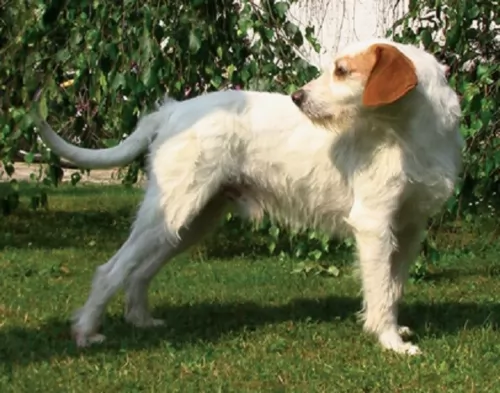 The Istarski Ostrodlaki Gonic, also referred to as the Istrian wire-haired or short-haired scenthound is a very ancient dog breed. Apparently the dog has been found in paintings that go way back to the early 1700s.
The Istarski Ostrodlaki Gonic, also referred to as the Istrian wire-haired or short-haired scenthound is a very ancient dog breed. Apparently the dog has been found in paintings that go way back to the early 1700s.
The dog can either have a short, smooth coat or a rough, wiry longer coat. He has always been popular with hunters, used for hunting rabbits and fox.
An interesting fact with this dog is the correlation between the Dalmatian dog and the Istrian short-haired hound. According to veterinary investigations, there are strong likenesses between the two breeds.
The truth is, the origin of the Istrian has been a matter of dispute for some time but in 2003 the Federation Cynologique Internationale recognized the breed as hailing from Croatia.
 The Latvian Hound is a medium sized Russian or Latvian hunting hound. The dog was bred in Latvia, Russia.
The Latvian Hound is a medium sized Russian or Latvian hunting hound. The dog was bred in Latvia, Russia.
He was developed from a number of English and Polish dogs as well as Lucernese breeds.
It is by no means a new breed and records of it go way back to the 1600s. A certain Duke Courland developed the dog so that it was also known as the Courland Hound. In 1922 the Latvian Association of Hunters' Associations was formed.
It was in 1971 that the Latvian Hound was was approved with it's name and a new standard was developed and approved. It isn't recognized by the AKC or the FCI.
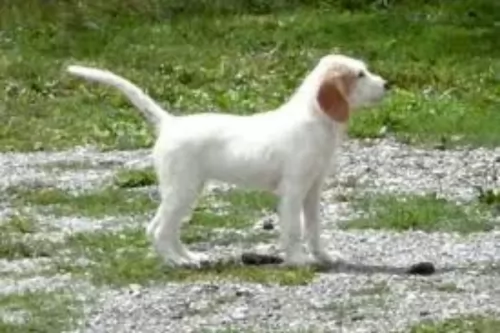 Medium in size, the Istarski Ostrodlaki Gonic stands at roughly 43 to 60cm at the withers and weighs roughly 12 to 27kg. The chest of the dog is broad and deep, the skull slightly rounded while the muzzle is strong and rectangular shaped. The nose is dark brown or black.
Medium in size, the Istarski Ostrodlaki Gonic stands at roughly 43 to 60cm at the withers and weighs roughly 12 to 27kg. The chest of the dog is broad and deep, the skull slightly rounded while the muzzle is strong and rectangular shaped. The nose is dark brown or black.
The ears are floppy and are nearly always in the orange color while the tail is long and is carried low. The coat of the rough haired dog is of medium length. In fact the coat can either be short and smooth or longish and wiry with a woolly undercoat. The color of the coat is white with orange markings.
This breed of dog is sought after for his cheerful personality. He is loyal to his human family and is a social dog, loving to spend time around his family.
He is energetic, confident and strong-willed and this is why, as with most other dogs, he will benefit from training and socialization, as this makes him obedient and responsive to his owner. He is evenly tempered, being gentle and docile.
 The Latvian Hound is a medium sized dog standing at between 40 to 48cm in height and weighing about 15 to 20kg.
The Latvian Hound is a medium sized dog standing at between 40 to 48cm in height and weighing about 15 to 20kg.
He has a deep chest, fairly long, floppy ears, a long tail with strong legs. The coat is double and is short, shiny and dense. He is an average shedder. He is essentially black with tan markings, with tan spots above the eyes. The eyes are dark brown and the nose is black.
The Latvian Hound may well be an exceptional hunter but he also makes a great family pet. He is looked upon as being a friendly, amicable, sweet dog.
Because he has been a working dog, he likes to be busy and will happily join in with all your hikes and swimming. He will also run with you while you cycle.
It’s a dog that doesn’t like to be left alone for long periods of time, being inclined to suffer with separation anxiety. He doesn’t take kindly to strangers either, but a dog which has been socialized and trained becomes more amicable.
Your Latvian is intelligent so you won’t have any trouble teaching him some simply commands. He is a friendly, lively dog and just having him in your home brings in a joyous atmosphere. He is an easy-going dog, but even so, if you don’t have a fair sized garden and you don’t have the time to exercise him, he is better off living on a farm or where there is a fair sized garden.
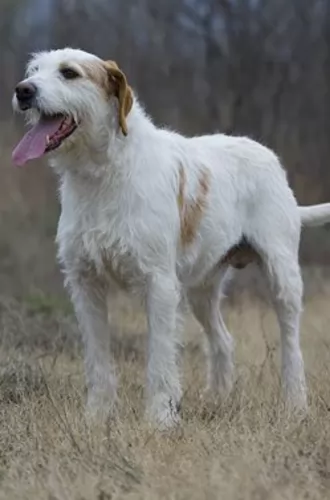 The Istrian Wire-haired Scenthound or Istarski Ostrodlaki Gonic as he is also referred to is a strong, well built hound which is elegant in appearance.
The Istrian Wire-haired Scenthound or Istarski Ostrodlaki Gonic as he is also referred to is a strong, well built hound which is elegant in appearance.
He has a remarkably striking coat - bright white with orange markings. He has always been an excellent hunting dog, even to this day. This background hunting of his will require that he receives ongoing exercise as well as mental stimulation.
Treat this beautiful dog well - exercise him, groom him, feed him well and love him and you will be rewarded with the loyal and devoted friendship of an amazing dog.
 The Latvian Hound is an outgoing, fun dog to have around and a great dog for first-time dog owners too. He has always been a working dog, so he has developed skills such as being focused and tenacious.
The Latvian Hound is an outgoing, fun dog to have around and a great dog for first-time dog owners too. He has always been a working dog, so he has developed skills such as being focused and tenacious.
As a companion and family dog, you will have a true friend as he is sweet, loving and loyal and thrives on the attention of his human family. He is a playful dog, feisty and energetic, and will be protective too. Bring him into your home and you'll see what a bright place it becomes just having him there as pet and friend.
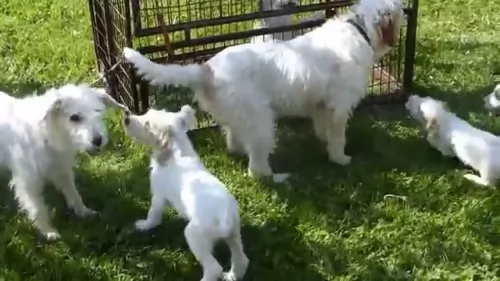 There are people who don’t take dental disease seriously in dogs as they think that it simply affects the teeth, when in fact dental disease can affect the dog’s entire body.
There are people who don’t take dental disease seriously in dogs as they think that it simply affects the teeth, when in fact dental disease can affect the dog’s entire body.
Dental- and gum disease is to be regarded with concern as it can be painful and even life threatening. It affects many dogs, and unfortunately your Istarski is also likely to have problems with his teeth. Tartar build-up and infection of the gums can lead to tooth loss but also damage to the kidneys, heart and joints.
Dogs need to have their teeth attended to regularly and if this is something new to you, speak to your vet and find out about special canine toothpaste and toothbrush and how to use them.
Dogs can be susceptible to bacterial and viral infections such as rabies, distemper and parvo, and that is why visits to your vet are so important. These life-threatening diseases for your Istarski Ostrodlaki Gonic are preventable through vaccinations.
 The life span of the Latvian Hound is 12 to 14 years, and while there are no reported major health issues, all dogs face some kind of medical issues during their lives. The Latvian Hound can face things like hip dysplasia, eye problems, bloat and ear infections.
The life span of the Latvian Hound is 12 to 14 years, and while there are no reported major health issues, all dogs face some kind of medical issues during their lives. The Latvian Hound can face things like hip dysplasia, eye problems, bloat and ear infections.
Vaccines can protect your dog from contracting some illnesses which can be fatal.
There is controversy over pet vaccines but the problem is more about HOW the dog is vaccinated.
There was a time when puppies were vaccinated many times, but newer guidelines were updated in 2017, stating that core vaccines be given to adult dogs in intervals of 3 years or more, rather than every year.
Puppy vaccines still need to be done about every 3 weeks between the ages of 6 and 16 weeks against the likes of parvovirus and distemper. Get yourself a good vet who is skilled and safe with vaccines.
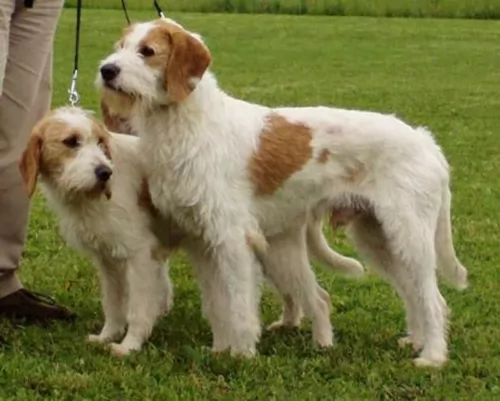 Taking care of an Istarski Ostrodlaki Gonic dog is much like caring for a child – doing everything you can to keep him healthy and happy, after all, he is a member of your family.
Taking care of an Istarski Ostrodlaki Gonic dog is much like caring for a child – doing everything you can to keep him healthy and happy, after all, he is a member of your family.
You want to be watching his diet and making sure that it is the best quality there is, full of vitamins and minerals to keep his eyes bright, his nose wet and his tail wagging.
There are excellent commercially manufactured dog foods on the market today and the best ones ensure excellent nutrition for your dog to keep him in optimal condition through each stage that he goes through. Try to include some home-made food into this kibble such as cooked chicken, brown rice and vegetables and it can be to his benefit to just to include some raw meat from time to time.
Make sure your Istarski Ostrodlaki Gonic is well exercised, that you check his teeth and ears to ensure there are no infections and to call the vet immediately you suspect something is wrong. Make sure you have him examined as a puppy and that he gets his necessary injections as there are diseases that can kill your dog.
 The Latvian Hound has a short coat that is easy to groom. He is a moderate shedder and brushing him twice a week will take care of all that loose hair. He’ll thrive on the attention this grooming session gives him and its the time to check him over for ticks and fleas too.
The Latvian Hound has a short coat that is easy to groom. He is a moderate shedder and brushing him twice a week will take care of all that loose hair. He’ll thrive on the attention this grooming session gives him and its the time to check him over for ticks and fleas too.
Check the inside of his ears. Without even realizing it, dirt and wax can build up and result in an ear infection. His ear may be red and you’ll notice him shaking his head and scratching at his ears. Be very careful about cleaning his ears as going to deep can damage the ear.
Any grooming of your dog that you can’t manage can be attended to by professional dog groomers.